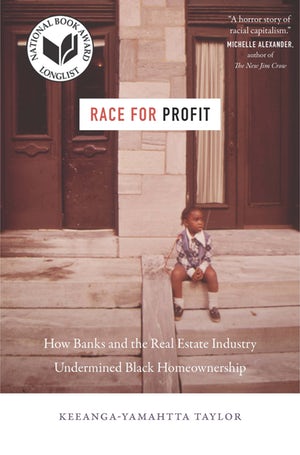By UIC
National Book Award-nominated author Keeanga-Yamahtta Taylor will discuss her book, Race for Profit: How Banks and the Real Estate Industry Undermined Black Homeownership, at the University of Illinois at Chicago’s Social Justice Initiative next Wednesday.
Taylor, assistant professor of African American studies at Princeton University, writes and speaks on politics, social movements, and racial inequality in the U.S. She will appear in conversation with Elizabeth Todd-Breland, UIC associate professor of history and author of A Political Education: Black Politics and Education Reform in Post-Civil Rights Chicago.

Taylor’s book, which is longlisted for the 2019 National Book Award for nonfiction, looks at how politicians in the late 1960s and 1970s had to deal with pushback from urban communities over redlining and other long-established discriminatory practices. As a result, the Housing and Urban Development Act was passed in 1968 to push mortgage lenders and the real estate community to treat black homebuyers equally. The creation of HUD, however, hardly wiped out racist exclusion. Instead, Taylor says, it produced a system of “predatory inclusion,” and new policies meant to encourage low-income homeownership only created new methods to exploit black homeowners.
Serving as event moderator is UIC’s Todd-Breland, whose research and teaching focuses on 20th-century U.S. urban and social history, African-American history and the history of education. Her work also explores interdisciplinary issues related to racial and economic inequality, urban policy, neighborhood transformation, education policy and civic engagement.
The event is sponsored by UIC’s Social Justice Initiative, or SJI, which is a campus program that aims to build on socially conscious research and interests across different disciplines, improve connections with community partners and serve students interested in social justice work.
Keeanga-Yamahtta Taylor’s discussion continues SJI’s theme, “Home,” for the 2019-2020 school year. The group will tackle topics such as, “What does it mean when a prison cell is supposed to substitute for a home?” This topic is especially important as 2 million people in the U.S., including migrant families, are currently in detention.
Last month, the initiative held a discussion with Angola 3 prisoner Albert Woodfox, whose book Solitary focused on his more than 40 years in solitary confinement and is a finalist for the National Book Award for nonfiction.
The Oct. 30 event is free, but registration is required here. The deets:
WHEN: Oct. 30, 6 p.m. – 7:30 p.m.
WHERE: Room 302, Student Center East, 750 South Halsted Street
–
See also:
* Taylor in the New York Times: When The Dream Of Owning A Home Became A Nightmare | A federal program to encourage black homeownership in the 1970s ended in a flood of foreclosures.
* Library Journal: “Essential for readers wishing to understand the depth and differentials of U.S. racial discrimination, Taylor’s masterly exposé of the political economy of the racially bifurcated market systematically lays bare how residential segregation made profits from race; it also illustrates the mismatch of market solutions to racist policies and practices and underscores the limits of legislation alone to undo institutional racism.”
–
Comments welcome.
–
1. From Mike Klonsky:
You might also point out that Elizabeth Todd-Breland is also a member of Mayor Lightfoot’s appointed school board.
Indeed.
Posted on October 25, 2019


